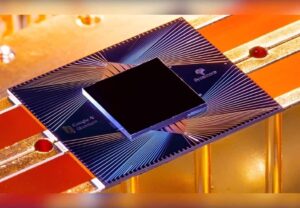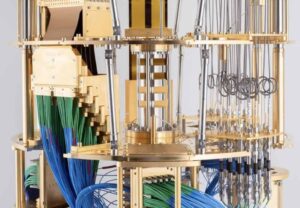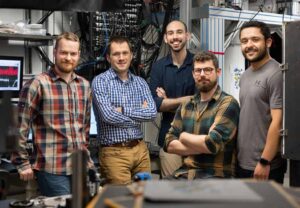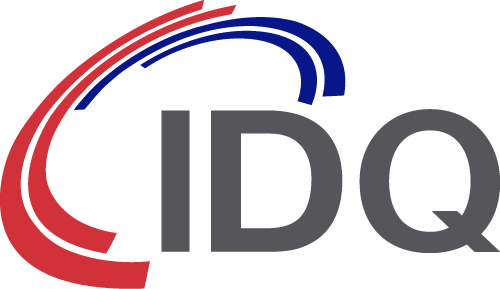Quantum Computing Review Q3 2023
Welcome to the latest edition of our quarterly quantum computing review.
In this edition, we have some ground-breaking news from tech giants Google and IBM, plus a number of exciting collaborations between industry and academia, designed to expand the frontiers of quantum technologies. There is also news of poneering use of quantum computing in fields as diverse as chemical dynamics, particle physics and driverless cars!
Google’s quantum breakthrough
 Q3 got off to a rapid start with Google’s quantum computing department announcing a major breakthrough on their quantum journey.
Q3 got off to a rapid start with Google’s quantum computing department announcing a major breakthrough on their quantum journey.
In early July, researchers published a paper featuring their new 70 qubit system – a significant uplift in power over the previous 53 qubit system that demonstrated quantum supremacy back in 2019.
The exponential increase in power reportedly makes calculations almost instantly that conventional supercomputers would take 47 years to complete. Though the specific task the computer was asked to complete has little or no real-world applications, it serves to demonstrate the evolving potential of quantum computing systems.
IBM makes error correction simpler

In mid-August, researchers at IBM quantum published a new set of codes that effectively work with ten times fewer qubits; bringing practical, fault-tolerant quantum computing one step closer.
One of the biggest challenges to today’s quantum computers is that they are “noisy”. They have a high error rate that is a barrier to adoption.
However, advances in error correction, in tandem with hardware and processor innovation, are cause for optimism amongst the quantum computing community that fault tolerant quantum computing isn’t just viable, but ultimately practical.
A new approach to quantum repeaters

Quantum networks won’t work the same way as today’s classical data networks. Quantum signals are more fragile by nature and next-generation networks will need to feature quantum repeaters.
A new Princeton study details the basis for a new approach to building quantum repeaters, combining significant advancements in photonic design and materials science.
Contemporary repeaters emit light in the visible spectrum, which degrades quickly over optical fiber and requires conversion before it can travel any significant distance. The new approach emits light at an infrared wavelength and doesn’t require conversion, paving the way to simpler, more robust networks.
Legislative landscape
As the global race for quantum advantage continues, the Biden administration took steps to limit overseas investment by US entities in China, Hong Kong, and Macau. Specifically, an Executive Order published in August seeks to prohibit US investment in what it refers to as “national Security Technologies” most notably semiconductors, quantum technologies and artificial intelligence.
Quantum announcements
At the Quantum World Congress in Washington in September, IonQ announced an expansion of its product line with two new, rack-mounted processors: IonQ Forte Enterprise and IonQ Tempo. Both represent efforts by IonQ to reduce the overall footprint of its technology, making it more suitable for inclusion in conventional data centres. At the same time, IonQ announced it had been awarded an additional $25million contract to provide quantum computers to the US Air Force.

It’s been a busy few months for IonQ, who also partnered with the University of Maryland in the development of the $20million National Quantum Laboratory (QLab), opened in September at the UMDs headquarters.
In a further example of commerce and academia collaborating on quantum, Abu Dhabi University and Vernewell Group signed a memorandum of understanding, signifying their intent to exploit the opportunities represented by DARQ technologies – Distributed Ledger, Artificial Intelligence, Extended Reality and Quantum computing.
In August, Deutsche Telekom opened a Quantum Lab at its T-Lab facility in Berlin. Dedicated to quantum research and the integration of quantum technologies into commercial communications networks, the facility is connected to academic institutes in Berlin, Dresden, and Munich.
China Mobile collaborated with China Electronics Technology Group Corp (CETGC) to launch the largest quantum cloud computing platform in China. A hybrid environment, the cloud platform links classical computing resources with advanced 20-qubit quantum devices to provide an open testbed to researchers and enterprises, and to grant public access to universities and other agencies.
In the UK, Imperial College London launched its QuEST initiative (Centre for Quantum Engineering, Science and Technology). Designed to complement the UK Government’s National Quantum Strategy, QuEST will provide further impetus to an already impressive legacy of quantum achievements at the world-famous institution.
In late July, D-Wave announced two new collaborations with the Institute of Quantum computing at the University of Waterloo. Funded by the Natural Sciences and Engineering Research Council, the long-term projects will focus on “identifying improvements in device design and materials quality that support increasingly coherent superconducting quantum processors”.
Quantum applications
As quantum technology evolves, it is finding new applications across a wide range of disciplines. In the world of chemistry, researchers have used a trapped-ion quantum computer to revolutionize how we observe a geometric process in chemical dynamics that has had chemists and physicists stumped since the 1950s. In a paper published in Nature, they revealed how they designed and mapped the complex problem onto a small quantum device and slowed the process by a factor of 100 million.
In the field of Lidar applications and driverless cars, quantum technologies are being used to improve visibility of objects in bright sunlight. Driverless cars can use laser pulses to sense objects and measure how far away they are, but this can be affected in very bright conditions, or where light is reflected from nearby objects. Swapping out the lasers for particles of quantum light could make it easier for autonomous vehicles to avoid collisions.
In July, researchers from CERN, DESY, IBM Quantum and over 30 other organisations published a paper identifying specific activities in the realm of particle physics where emerging quantum computing technologies could be applied.
Quantum computing is very promising, but not every problem in particle physics is suited to this mode of computing. […]
It’s important to ensure that we are ready and that we can accurately identify the areas where these technologies have the potential to be most useful for our community.
Alberto Di Meglio, head of the CERN Quantum Technology Initiative (CERN QTI)
A research team at Ecole Normale Supérieure de Lyon, CNRS recently developed a quantum radar that could significantly outperform existing systems based on classical approaches. Previous research had demonstrated that quantum correlations could make radar detection up to four times faster. Initial results show the microwave quantum radar developed by the researchers sped up radar detection by 20% compared to classical radars.
IDQ in the news
Quantis QRNG Chip receives NIST Entropy Source Validation (ESV) Certification on IID Track
Why it is time to implement a Quantum-Safe Network – a Forbes article by IDQ CEO Gregoire Ribordy
IDQ leads standardization efforts at ETSI to accelerate the adoption of QKD technology
ID Quantique attends QCRYPT 2023



